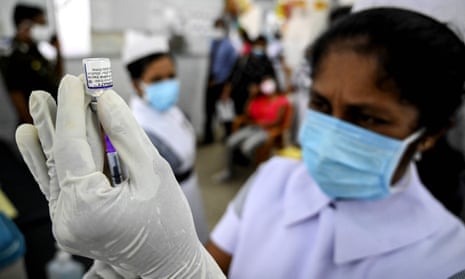The Australian government is being urged to donate 20m extra vaccines to help lower-income countries combat Covid-19, as a new report warns the pandemic “will not end for anyone until it ends for everyone”.
With New South Wales reopening on Monday, a report backed by a coalition of aid, health, business and civil society groups argues Australia must “not close its eyes to the impacts of the pandemic in other parts of the world”.
The Rev Tim Costello, from the campaign group End Covid For All, cited not just the moral imperative to help the rest of the globe, but also the risk of more variants emerging in places where vaccination rates were lagging.
“The Delta strain, and the havoc it has wreaked across Australia, shows we cannot allow Covid to run rampant and mutate overseas,” Costello said.
“The last thing we want, on freedom day in NSW, is the prospect of further deaths and lockdowns because we didn’t do all that we could to vaccinate the world.”
The report, published on Monday, says more than 19 low income countries have such low rates of vaccination that, on current rates, they would not vaccinate 70% of their populations until after 2030.
It calls on Australia to promise to share another 20m vaccines through the Covax facility, while also investing an extra $250m in the same initiative.
The report suggests Australia should invest in becoming “a vaccine factory for the region” and draw up plans to respond to outbreaks across the Indo-Pacific.
The report calls on the Australian government to spend $50m on combating vaccine hesitancy in south-east Asia and the Pacific “through strengthened partnerships with trusted, community led organisations”.
The report was co-authored by researchers, analysts and leaders from 11 organisations, including the Burnet Institute, Micah Australia, Australian Global Health Alliance, Médecins Sans Frontières Australia, Unicef Australia and World Vision Australia.
“The emergence of the Delta variant shows that Australia can not close its eyes to the impacts of the pandemic in other parts of the world,” the report, titled A shot of hope – Australia’s role in vaccinating the world, says.
“First, because that is morally wrong. But also because, sooner or later, the consequences will be felt here. That is why we must play a leading role in aggressively responding to this pandemic on a global scale.”
On Saturday NSW’s chief health officer, Dr Kerry Chant, revealed the state’s health authorities had “detected a genome of the Delta strain which is different from that that was previously transmitting in our community”.
Chant said NSW Health had “linked that back to a person who returned from overseas” – but she wanted to reassure people there was no sign it was any more transmissible or dangerous.
Monday’s “shot of hope” report notes further mutations will also increase the demand for vaccine boosters, particularly in higher income countries like Australia.
“However, critical to ending Covid-19 for all is ensuring the vaccine distribution is equitable,” the report says.
“While third shots for the elderly and vulnerable in rich countries may be a part of an effective vaccination program, valuable manufacturing capacity should not be prioritised for population wide booster vaccinations while much of the world remains off track to meet the 2022 goal.
“Global vaccine coverage with initial doses should be a prerequisite before supplementary booster doses are manufactured and distributed – anything other than this would be ‘skipping the queue’.”
Numerous countries – including the United Kingdom, the United States and Israel – have begun offering Covid-19 vaccine booster shots.
In Australia, severely immunocompromised people will be able to get Covid-19 vaccine boosters from Monday, after the vaccine regulatory body approved the jab for the vulnerable section of the community.
The Australian government expects about 500,000 Australians to be eligible for the initial rollout of booster shots, which includes people aged above 12 who have conditions that severely weaken their immune defences, as well as patients receiving cancer treatment and other therapies.
Quick GuideHow to get the latest news from Guardian Australia
Show

Email: sign up for our daily morning and afternoon email newsletters
App: download our free app and never miss the biggest stories
Social: follow us on YouTube, TikTok, Instagram, Facebook or Twitter
Podcast: listen to our daily episodes on Apple Podcasts, Spotify or search "Full Story" in your favourite app
The Australian government welcomed Monday’s report, describing it as a “constructive contribution”.
Zed Seselja, the minister for international development and the Pacific, said: “Australia is absolutely committed to equitable access to Covid vaccines, including for developing countries, with a particular focus on ensuring our region is not left behind.”
The need for greater distribution of vaccines was one of the issues on the agenda at the first in-person meeting of the Quad leaders in Washington late last month. The prime minister, Scott Morrison, acknowledged the need to act as it would “increasingly become a pandemic of the disadvantaged”.
Morrison also addressed a summit convened by the US president, Joe Biden, and announced that Australia would “share [with the Indo-Pacific region] a further 20m doses, and procure up to another 20m doses beyond that” by the end of 2022.
